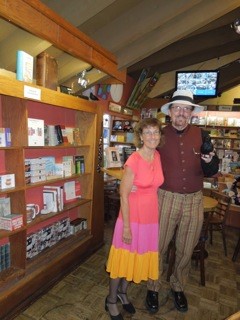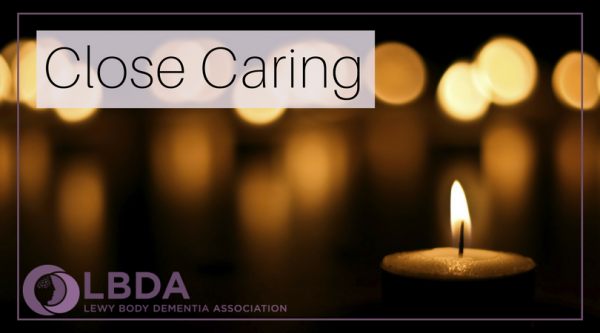Close Caring
Today, I am blessed by having a Visiting Angel named Shannon who was also an alcoholic, although I am still working on her to quit the cigarettes. Since my own daughter is Shannon’s age, and had gone down the road of meth addiction and welfare abuse leading to a meth lab explosion in her home, I consider Shannon’s grand motherhood (yes, she is also a grandmother) to be a loving reflection on my daily reality as writer and lover of the last days of my wife. We both treat her with devotion and lovely caresses, and this is the key to any human activity, something that has gone missing in cultures that put a sharp divide between what is seen as “manly” and “womanly” behaviors. These months taking personal care of my wife have been the most awakening experience I could have ever lived out there on the manly golf courses or other refuges. I am learning a lot more on our reservation. Shannon even told me that I was one of the few husbands she had seen in hospice care that stayed next to their wives during this period of slow mourning toward release.
Sundowning. I laugh and tell her I spent twenty years guzzling intoxicating substances in order to sit in the shadows of life, so why should I be afraid to learn something from the intimate contact with my declining wife now, when I am in the full light of sober wisdom? Yes, my Ellen has changed from the quick-witted, studious woman I married twenty-two years ago, but all those years of sharing the trials and joys together have to mean something, and I choose to give her the respect she deserves until the end.
What have I learned from this dedicated experience caring closely for my wife? Well, I learned that I can write even amidst the pain of seeing her in pain and in the agony of a mentally debilitating disease that rips away at your human dignity like a panther on the loose in the zoo. I have discovered many people are afraid of these loose panthers in that they have become so fixated on what society calls “normal” that persons who become victims of diseases like LBD are like candles that have had their flames slowly dimmed within until all one sees is the confusing reality of a moment held onto for dear life. While my wife sees me and the others pass before her, she must gradually console her pride with the stupendous feat of holding her own drinking carton of protein shake and sucking on a straw (Shannon noted that whenever a relative is visiting, Ellen will especially want to show her control over her own feeding. After all, when one is being bathed, having one’s urine cleaned from a bag, in the relative universe in which I dwell, any act of courage should be cherished, and it is the act of human compassion that has made my writing any good, so it is that when humans are able to see life from the other’s perspective, especially in their darkest moments, they can then reflect on what they would need if they were in a similar situation.)
Below are the most precious things that I have learned during these months that can never be learned anywhere else on Earth:
- I learned that people you’ve known a long time can turn their backs on you because of their own fears. One person even said when I told him/her that Ellen was getting serious bed sores and a urinary tract infection that we “could just let it continue its course to end her life.” She was, after all, on hospice. I even got rid of two hospice nurses who believed the same logic. They wanted to dull her remaining senses with strong opiates and one also said to Shannon (not to me) that she believed Ellen’s bed sore and urine infection wouldn’t be getting any better, so why try more antibiotics?
- I learned antibiotics can cure bed wounds (why do they call them “sores” when they appear to be gaping craters in the body that reveal the bone?). I also learned that too many antibiotics can cause damage to other organs, and when blood began to appear in my wife’s urine, another risk came to light in the shadowy bedroom of our home. What if they were right, and our use of antibiotics was killing her? Oh, but she was getting a few more precious days, wasn’t she? I hungered for those days, seeing a glimmer of hope in her hazel eyes, watching the sides of her mouth for that upturn I knew so well. Against the backdrop of such inner turmoil, both inside my wife and inside me, a smile can be the explosion of a dark mine filled with jewels that scatter in front of your tear-filled eyes like momentary fragments of cutting beauty—slicing into my very soul with its comforting peace. I can see what difficulty that smile is for my love, and it makes her my hero for that moment, don’t you see? All of you who choose to not look or listen because of your own fear. Don’t you think I also have fear? I make my existence palatable through writing down my thoughts. What my wife is experiencing is the biggest fear I have: my mind taking a detour. My memory fading like a flickering candle’s wick. And yet, somehow, she is cleansing me in my inner spiritual existence like nothing else, and I just want to share my joy, such as it is, in the hopes that somebody might see it through my eyes.
- The human body is only the wax on the candle, don’t you see? I’ve learned this lesson as well. I was a Catholic altar boy, and candles were important during the Mass. I lit them, cleaned the residue from their holders, watched them gleaming during services, hoping the priest would be brief with his homilies, so I could go out to play. We know not when we are young about the wisdom of symbols. I had no teacher then—none had appeared—only a drunk for a father and a mother who ran from pain until she lived to embrace its excitement.
- I learned that two Orthodox Jewish women were the only friends who wanted to be by my wife’s side for any amount of time. In spite of her mental condition, they will read to her, laugh with her, and pretend with her that the past really exists—in family photos, in passing frivolity that perhaps only women share—until I began to bathe in their kindness and also in their hope. That light was still shining inside my wife, wasn’t it? That light is what rules the night. I watched a young father on the nightly news explain to his French son about the evil men who murdered innocent civilians. He took the very existential approach by saying, “See all those flowers and candles over there? Those people put them there to protect us from those bad men. Their beauty and light will always protect us.” With those words, the young boy was very satisfied. My writer self would ask, “Is anybody seeing the pain from the eyes of the killers and their families? Being able to kill for an abstract value is similar to seeing that flowers and candles can protect you from evil. Doesn’t religion, on a fanatical level, become a kind of a magic potion that can protect you from anything—even murder—even death itself? No, not if you have human compassion that can see through the barriers the self creates to protect its own selfish view of reality. Honestly, if I decide to not kill others, then I dedicate my every waking moment to doing all activities that would not allow me to be in a position that would force me to do that (not join an army, not join an extremist group, not keep an arsenal of weapons, and all the other ways we put ourselves in harm’s way), then chances are that I will never kill another living candle.
- I learned that the problem lies with the wax. Our bodies are malleable and can be shaped into anything we want them to be. Appearance and image can become graven and seductive. People like my friends saw my wife, Ellen, as a dimmed version of themselves, and thus, not worthy of empathy and compassion. Everybody can have a moment of frozen reality when their wax becomes less flexible and unable to fit into a society—any society—without causing a ruckus. As a writer, I always wanted to be able to be above the fray, but when my wife became ill I learned to plunge down into the fray of being human. My wax cannot harden to the blue-gold of my wife’s light—however dim it might appear to others. There are dark secrets my wife has already shared with me about the people in her intimate life, and I have shared all of mine to remain sober and loving, but this constant sharing is what keeps us both entwined in this dalliance—this waltz each day toward death.
- I learned that when my wife, Ellen, dies, a part of me will want to die as well. But then, I look at a candle, and the wisdom comes seeping into me like the wisdom of the ages: her light was always there for me, and it will always be there for me in others—if I respect them, and if I show human compassion and understanding until they show me they no longer care about those things. And then, I only need to make a decision to walk away from their ideas and find new friends. Some people want to force their ideas of what is normal upon you, and you either choose to rebel (as the French philosopher Camus said), or you can accept their brand of social astigmatism and ride with the wave of the ones who want to walk away from illness, from mental problems, from addiction, from all the underlying problems in our societies that send the young searching for ultimate truths that can end in false idols who point fingers and ask that you die for them. My wife is dying, but she is not dying for me. She is dying for herself, and her courage during these painful days bring me closer to love and to my fellow humans. She will always be my candle in the wind, no matter how difficult it may appear to get after her passing, and I thank her for every second she gave me that belief in myself and in the will to see the Truth in the world for what it is, and not for what I wanted to believe it was because of my bad childhood memories or any other waxed, twisted seduction that led me away from her calm, and trusting hazel eyes. The candle will always bring me brightness, and it will give me hope for when the sun goes down, and when I lose my way. I love you, Ellen. Stay beautiful and alive until your last breath. You teach me by your daily courage to fight this thing, and I’m fighting on your team.
* * *
Jim Musgrave is a retired college professor who lives in San Diego. He is an independent author and publisher who owns EMRE Publishing, LLC. His titles were recently accepted into theLibrary Journal’s new Self-E Program to promote self-published and independent artists.


Jim Musgrave
Dec 18, 2016